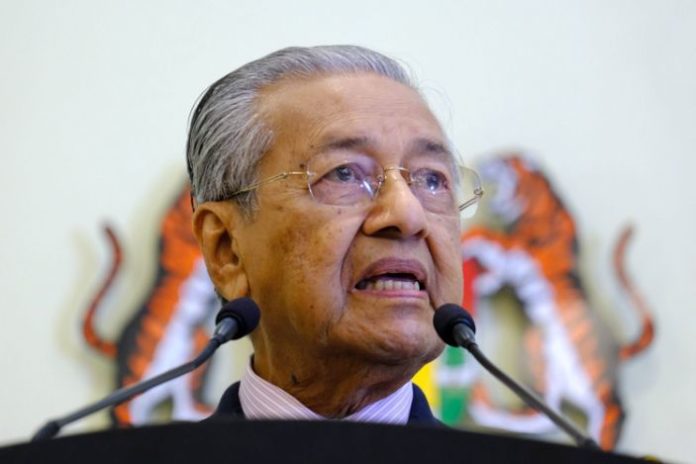In the weeks before his shock resignation as prime minister threw Malaysia into turmoil, Mahathir Mohamad was getting agitated.
His then-ruling alliance had suffered a series of by-election losses, stunting its momentum after a historic election win in 2018 against a government in power for six decades. Mahathir wanted quicker action to reduce living costs, a key part of the “New Malaysia” agenda that had propelled the bloc’s surprise win. But his proposals only spurred more bickering within the unwieldy coalition of four parties with racial and religious differences.
One conflict centered around highway tolls. In January, Mahathir agreed to let the conglomerate Maju Group take over highways operator PLUS Malaysia Bhd., which is controlled by the finance ministry, according to people familiar with the matter who asked not to be identified. Under the deal, valued at about 30 billion ringgit ($7 billion), Maju Group would’ve scrapped toll fees in return for government contracts to maintain the roads, the people said.
But his coalition partners disagreed: The largest, the Democratic Action Party or DAP, was strongly opposed to the deal because it wanted PLUS to be directly held by the government, according to a person familiar with the discussions. In the end, the administration rejected all bids for PLUS and restructured concessions to reduce highway fares instead of eliminating them.
The failed deal highlighted a series of policy disputes that eventually brought down the coalition, showing that the differences in Mahathir’s government extended far beyond when he would cede power to Anwar Ibrahim, his long-time rival. New Prime Minister Muhyiddin Yassin is backed by parties that lost in 2018, shifting Malaysia back to an agenda favoring the Malay majority.
Mahathir, 94, hasn’t given up: He’s revived the alliance with Anwar and the DAP, and said on Sunday he has the numbers to oust Muhyiddin in a confidence vote during the next meeting of parliament, now scheduled for March 9. But even if he manages to quickly return to power, those policy differences in his coalition still remain — signaling more turbulence ahead either way.
For Malaysia, the political disarray comes at a bad time: The economy is already growing at the slowest pace in a decade, and faces more downside risk as the global coronavirus outbreak disrupts travel and business operations. Malaysia’s stock index is one of the world’s worst performers since the 2018 election, and the ringgit last week reached the lowest level in two years.
This account of what led to Mahathir’s resignation is based on conversations with multiple officials who asked not to be identified talking about private matters.
Cabinet Revamp
The infighting that brought down Mahathir’s government had been brewing for months. He had wanted a cabinet revamp since at least November, but the disparate nature of the coalition — made up of parties with contrasting views, including the multiracial DAP whose top leaders are mostly ethnic Chinese and his own Malay nationalist party — meant he had to tread carefully or risk dismantling the alliance.
While Mahathir was mainly disappointed with the management of the economy, he could only oust ministers who belonged to his own party to avoid destabilizing the coalition, according to a person familiar with the discussions. One of them was then-Education Minister Maszlee Malik, a member of his Malaysian United Indigenous Party, or Bersatu, who came under fire for pushing policies that appeared to bolster Islamic influence in public education. His termination in January was meant to prod ministers Mahathir couldn’t forcibly remove, the person said.
But it made little impact. The PLUS deal was one example: Mahathir’s cabinet had invited companies to present bids for the company, which were then evaluated by the ministry of works. Maju Group was so confident it would be approved that it had begun approaching banks for funding, even before a decision was to be made at a Jan. 9 cabinet meeting, two people said. But the DAP opposed it because of Maju Group’s track record and its close relationship with Mahathir, a person said.
When the deal eventually collapsed, Maju Group’s executive chairman, Abu Sahid Mohamed, called the decision “stupid.” Mahathir said the final call came down to PLUS’s main shareholders: Khazanah Nasional Bhd. and Employees Provident Fund, both state-owned funds that manage public money.
Maju Group, Abu Sahid, the DAP, former Finance Minister Lim Guan Eng and Mahathir’s office didn’t respond to requests for comment on the deal. The finance ministry declined to comment.
‘All of Them Are Weak’
Other key policy decisions also stalled due to differences in the cabinet. They included how to turn around companies from ailing flag carrier Malaysia Airlines Bhd. to FGV Holdings Bhd, one of the world’s largest producers of palm oil.
On Jan. 20, Mahathir made a rare show of frustration in a meeting with journalists, warning his administration could be a one-term government unless it changes.
“They still don’t understand,” he said. “Instead they fight among themselves, they divide their people and all of them are weak.”
As tensions within the cabinet grew, questions again began to surface over succession. Mahathir had repeatedly pushed back the date he planned to step aside for Anwar, who said publicly he expected to become prime minister around May.
Several of Anwar’s rivals to the succession saw an opportunity to pounce. Azmin Ali, who was deputy president in Anwar’s party, began holding talks with members of the opposition in the former ruling coalition anchored by the United Malays National Organisation, or UMNO. That party includes Najib Razak, who faces charges he denies over a money laundering scandal involving billions of dollars allegedly siphoned from state investment firm 1MDB.
Succession Fight
After a coalition meeting on Feb. 21, Mahathir and coalition leaders announced that he would stay on through the Asia-Pacific Economic Cooperation meetings this year, which are being hosted in Malaysia. He said he retained the authority to decide whether he would step down at all. Anwar concurred and said he would need to be patient.
“There were two opinions, but in the end — and I’m proud of this — in the end it was all up to me, whatever I say, they will follow,” Mahathir said.
Yet all was not well. Saying he was acting on behalf of Mahathir, Azmin invited lawmakers from across the country that weekend to fly to Kuala Lumpur in a bid to form a new coalition that excluded Anwar, according to people who were present at the event. The Feb. 23 meeting, attended by leaders from across the ruling and opposition coalitions, anticipated announcing a new government shortly, the people said. Some leaders also met with the king that day.
But Mahathir himself didn’t attend the meeting, with his media adviser later saying that he didn’t agree with Azmin’s decision to work with UMNO. Instead, on Feb. 24 he went to the king and submitted his resignation — a move that automatically dismissed the cabinet. He was then immediately appointed interim prime minister, putting him in the driver’s seat to form a new coalition.
Unity Government
In public statements, Mahathir made it clear he wanted a unity government that was non-partisan, making it more likely he would get a cabinet that listens to him. He said he was willing to work with any individual lawmakers in UMNO but not the party as a whole, since it was still associated with Najib and corruption allegations.
“Keeping in mind Mahathir’s authoritarian propensity and draconian track record, that sort of unity government is but a few steps away from de facto dictatorship,” said Oh Ei Sun, a senior fellow with the Singapore Institute of International Affairs. “It could only be viable if he clamps down on dissent as before, and the lack of opposition would regress Malaysia to the dismal oppression of his first term.”
The 20 billion ringgit ($4.7 billion) stimulus package Mahathir announced last week while he was interim prime minister reflected the divisions in his coalition. He made significant changes to the package compared with the version submitted earlier by the DAP-controlled finance ministry, said a person familiar with the matter.
Tactics Backfire
Mahathir’s tactics ended up backfiring. While many initially supported him to return, soon they were proposing alternative names for prime minister, including Anwar and Muhyiddin, who was president of Bersatu.
After all the chaos, Mahathir now finds himself back with Anwar and the DAP — but in the opposition rather than running the government. At the same time Muhyiddin’s new coalition appears similarly disparate, raising just as many questions about policy direction if it manages to survive Mahathir’s no-confidence vote and avoid a snap election.
“There doesn’t seem to be a strong sense of ideological direction,” Johan Saravanamuttu, an adjunct senior fellow at the S. Rajaratnam School of International Studies, said of Malaysia’s new government. “I’m wondering how long that coalition will hold together.”
.Bloomberg















